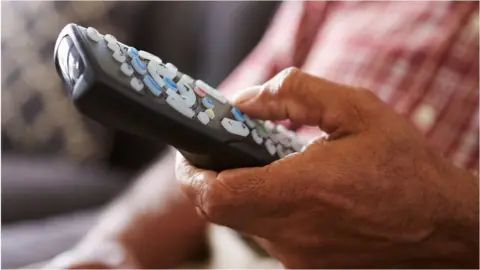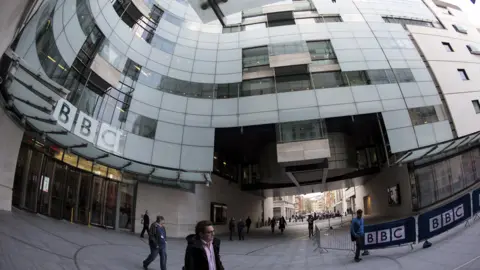BBC must do more for older people after TV licence fee change, government says
 Getty Images
Getty ImagesThe government has said the BBC must "do more to support older people" after the announcement that most over-75s will no longer get free TV licences.
Culture Secretary Jeremy Wright said he was "very disappointed" that the corporation had reached the decision.
But Labour deputy leader Tom Watson said the government had "breathtaking gall to blame the BBC for this mess".
The BBC said restricting free licences to over-75s who claim Pension Credit was "the fairest and best outcome".
Around 3.7 million pensioners are expected to lose out on the entitlement when the change comes into force in June 2020.
The decision comes four years after the government announced the BBC would take over the responsibility for providing free licences for over-75s by 2020 as part of the licence fee settlement.
At the same time, the BBC was allowed to increase the licence fee and make it obligatory to have a TV licence to use iPlayer. On Tuesday, Mr Wright told the House of Commons that was "a fair deal for the BBC".
Mr Wright also urged the corporation to "use its substantial licence fee income in an appropriate way", which included showing "restraint on salaries for senior staff".
He added: "I firmly believe that the BBC can and should do more to support older people. And I'm now looking to them to make clear exactly how they will do that."
A BBC spokeswoman said: "We've reached the fairest decision we can so we protect the poorest pensioners while ensuring everyone will continue to receive the best programmes and services that the BBC can provide."

- The new scheme will cost the BBC around £250m a year by 2021/22, depending on the take-up
- If the BBC continued to provide free TV licences to all over-75s, it would cost around £500m extra, the corporation said
- The BBC said that's equivalent to the cost of BBC Two, BBC Four, the BBC News Channel, the BBC Scotland channel, Radio 5 Live and a number of local radio stations - so services like that would be at risk
- By comparison, the total pay for on-air talent was £148m in 2017/2018
- The pay bill for senior managers in the same year was £37.7m

Maintaining free TV licences for those pensioners was part of the Conservative Party manifesto at the 2017 general election.
Conservative Party leadership candidate Andrea Leadsom called for a reversal of the plan, describing the decision as "unacceptable".
She said: "It's a commitment in the Conservatives' manifesto and we need to find a way to reverse that."
Her leadership rival Esther McVey said she was "ashamed" of the BBC, which had "forgotten the public they are supposed to serve".
Allow X content?
Labour deputy leader Tom Watson told the House of Commons that voters who read the manifesto pledge "have been betrayed and it's shameful".
He continued: "The government had the breathtaking gall to blame the BBC for this mess, but passing the buck won't work.
"The BBC is not the DWP [Department for Work and Pensions]. Public broadcasters should never be responsible for social policy."
Labour leader Jeremy Corbyn said "providing over-75s with free TV licences is not too much to ask".
Conservative MP Ed Vaizey, who was culture minister when the licence fee settlement was made, told MPs the government should "either take back this policy or support the BBC changes".
He said: "I was in the DCMS [Department for Culture, Media and Sport] when this policy was imposed on the BBC by the Treasury to meet its £12bn welfare target, a target which I doubt we have met and has long been forgotten."
He added: "It [the government] shouldn't use weasel words that undermine the changes the BBC has brought about."
Former Culture Secretary John Whittingdale said that when the decision was taken to transfer responsibility for free TV licences to the BBC "it was understood that this would be a possible outcome".
Under the new rules, only low-income households where one person receives the Pension Credit benefit will still be eligible for a free licence.
Copying the current scheme was "ultimately untenable", the BBC spokesperson said.
"The scale of the current concession and its quickly rising cost would have meant profoundly damaging closures of major services that we know audiences - and older audiences in particular - love, use, and value every day."
Around 190,000 people took part in a public consultation and there was "little public appetite" for closing services, the BBC said.
On Monday, Prime Minister Theresa May said she was "very disappointed" with the BBC's decision.
More than 150,000 people have signed a petition set up by the Age UK charity, which is calling for the government to take back responsibility for funding free TV licences.

BBC News put some questions to an official BBC spokesman, based on questions submitted on this website, on social media and via email to BBC News. Here is what they said.

How can the BBC justify cutting free TV licences to over-75s when it pays stars and executives such high salaries?
"We've reduced the costs of senior managers by £38 million and our spend on talent pay is also coming down," the spokesman said. "It's been well reported that some talent have taken pay cuts but in any event, it's simply not the case that senior talent and management pay cuts would make up anywhere near the difference.
"If we capped talent pay at £150,000 and got rid of every senior manager, that would only make up a fraction of the cost of continuing free licences for all over-75s."
Many pensioners who don't receive pension credit will still struggle to afford this - will they be prosecuted?
The BBC spokesman responded that the corporation will work with support groups "to make it as easy as possible" to get a licence. That will include a new payment plan featuring smaller fortnightly or monthly instalments, with telephone and personal support.
TV Licensing, which is responsible for collecting licence fees, "does everything reasonable to avoid prosecution", the spokesman said.
Hasn't the BBC gone back on its word to cover free TV licences for over-75s?
"This is simply not true. The government decided to stop paying for the free TV licences. Parliament gave the BBC responsibility to decide what should come next from June 2020 and to consult - and that's what we've done."
It was the biggest public consultation in the BBC's history, the spokesman added, with more than 190,000 responses received.

Follow us on Facebook, on Twitter @BBCNewsEnts, or on Instagram at bbcnewsents. If you have a story suggestion email [email protected].
